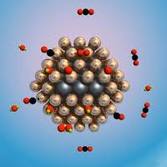 In a breakthrough for nanotechnology and multiple sclerosis, a biodegradable nanoparticle turns out to be the perfect vehicle to stealthily deliver an antigen that tricks the immune system into stopping its attack on myelin and halt a model of relapsing remitting multiple sclerosis (MS) in mice, according to new Northwestern Medicine research.
In a breakthrough for nanotechnology and multiple sclerosis, a biodegradable nanoparticle turns out to be the perfect vehicle to stealthily deliver an antigen that tricks the immune system into stopping its attack on myelin and halt a model of relapsing remitting multiple sclerosis (MS) in mice, according to new Northwestern Medicine research.
The new nanotechnology also can be applied to a variety of immune-mediated diseases including, Type 1 diabetes, food allergies, and airway allergies such as asthma.
In MS, the immune system attacks the myelin membrane that insulates nerves cells in the brain, spinal cord, and optic nerve. When the insulation is destroyed, electrical signals can’t be effectively conducted, resulting in symptoms that range from mild limb numbness to paralysis or blindness. About 80 percent of MS patients are diagnosed with the relapsing remitting form of the disease.
The Northwestern nanotechnology does not suppress the entire immune system as do current therapies for MS, which make patients more susceptible to everyday infections and higher rates of cancer. Rather, when the nanoparticles are attached to myelin antigens and injected into the mice, the immune system is reset to normal. The immune system stops recognizing myelin as an alien invader and halts its attack on it.
“This is a highly significant breakthrough in translational immunotherapy,” said Stephen Miller, PhD, a corresponding author of the study at Northwestern University Feinberg School of Medicine. “The beauty of this new technology is it can be used in many immune-related diseases. We simply change the antigen that’s delivered.”
“The holy grail is to develop a therapy that is specific to the pathological immune response, in this case the body attacking myelin,” Miller added. “Our approach resets the immune system so it no longer attacks myelin but leaves the function of the normal immune system intact.“
The nanoparticle, made from an easily produced and already FDA-approved substance, was developed by Lonnie Shea, professor of chemical and biological engineering at Northwestern’s McCormick School of Engineering and Applied Science.
“This is a major breakthrough in nanotechnology, showing you can use it to regulate the immune system,” said Shea, also a corresponding author. The paper will be published Nov. 18 in the journal Nature Biotechnology.
Source: NewsCenter Northwestern U.

 A new drug delivery technique may hold promise for more efficient cancer therapies. The technique involves storing a cancer drug inside tiny objects called nanoparticles which can carry drug molecules and target them to specific cells. Using this method, researchers were able to shrink tumors in mice while using smaller doses of the drug to reduce harmful side effects. For example, the chemotherapy drug cisplatin is an effective cell killer. It's used against half of all human cancers. However, cisplatin carries serious side effects, like kidney and nerve damage. These side effects limit the dose that can be used, which is a problem because the drug only lasts in the bloodstream for a short time.
A new drug delivery technique may hold promise for more efficient cancer therapies. The technique involves storing a cancer drug inside tiny objects called nanoparticles which can carry drug molecules and target them to specific cells. Using this method, researchers were able to shrink tumors in mice while using smaller doses of the drug to reduce harmful side effects. For example, the chemotherapy drug cisplatin is an effective cell killer. It's used against half of all human cancers. However, cisplatin carries serious side effects, like kidney and nerve damage. These side effects limit the dose that can be used, which is a problem because the drug only lasts in the bloodstream for a short time.